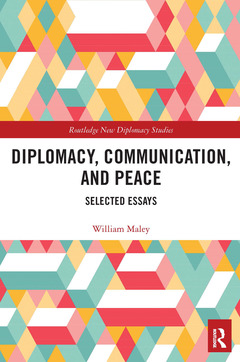Diplomacy, Communication, and Peace Selected Essays Routledge New Diplomacy Studies Series
Auteur : Maley William

This book is composed of interconnected essays which reflect on challenging new issues related to diplomacy, communication, and peace.
This book begins by drawing out some of the challenges for diplomacy that arise from modern theories of semantics and of strategic communication, as well as those posed by the need for secrecy, and by the activities of agents of influence. It then proceeds to examine important issues in contemporary diplomacy, including refugee diplomacy, humanitarian diplomacy, sovereignty, norms, and consular activities. It concludes with an exploration of dilemmas that confront attempts to promote peace through multilateral means, such as the limitations of peacemaking diplomacy, the difficulty of promoting democratic governance, and the problems associated with dealing with morally repugnant actors. The book is grounded in the conception of diplomacy as a social practice with multiple players, and recognises that ?the state? has many different elements, and that ?state actors? live in worlds shaped not just by their relations with other states, but also by their own complex domestic politics.
This book will be of much interest to students of diplomacy, foreign policy, and International Relations.
1. Introduction: Diplomacy, Diplomatic Studies, and Diplomatic History Part I: Diplomacy and Communication 2. Minimal English and Diplomacy 3. Terrorism, Diplomacy and Strategic Communication 4. Secret and Quiet Diplomacy 5. Agents of Influence Part II: New Directions in Diplomacy 6. Refugee Diplomacy 7. Australia’s Refugee Policy: Domestic Politics and Diplomatic Consequences 8. The United Nations, NGOs and the land-mines initiative: an Australian Perspective 9. Humanitarianism and Humanitarian Diplomacy 10. Trust, Legitimacy, and the Sharing of Sovereignty 11. Norms as Frames for Institutions 12. Risk, Populism and the Evolution of Consular Responsibilities Part III: Diplomacy and Peacemaking 13. Peacekeeping and Peacemaking 14. Democratic Governance and Post-Conflict Transitions 15. The United Nations and Ethnic Conflict Management: Lessons from the Disintegration of Yugoslavia 16. Negotiating with Morally-Repugnant Actors
William Maley is Professor of Diplomacy at the Asia-Pacific College of Diplomacy, The Australian National University.
Date de parution : 05-2022
15.6x23.4 cm
Date de parution : 11-2020
15.6x23.4 cm
Thèmes de Diplomacy, Communication, and Peace :
Mots-clés :
UN; Foreign Minister; diplomacy; International Humanitarian Law; secrecy; UNTAC; strategic communication; East Timor; state actors; Adolf Hitler; norms; Violated; consular activities; Natural Semantic Metalanguage; sovereignty; Consular Assistance; peace; UNHCR Executive Committee; Peacemaking diplomacy; Australia’s Refugee Policies; Refugee diplomacy; Capital Punishment; Rotten Compromise; Humanitarian diplomacy; Travel Warnings; Anti-personnel Mines; Shared Sovereignty; Minimal English; Low Level Mediation; International Refugee Organization; Kellogg Briand Pact; Bosnian Serb; Anti-personnel Landmines; Inhumane Weapons Convention; International Criminal Court



